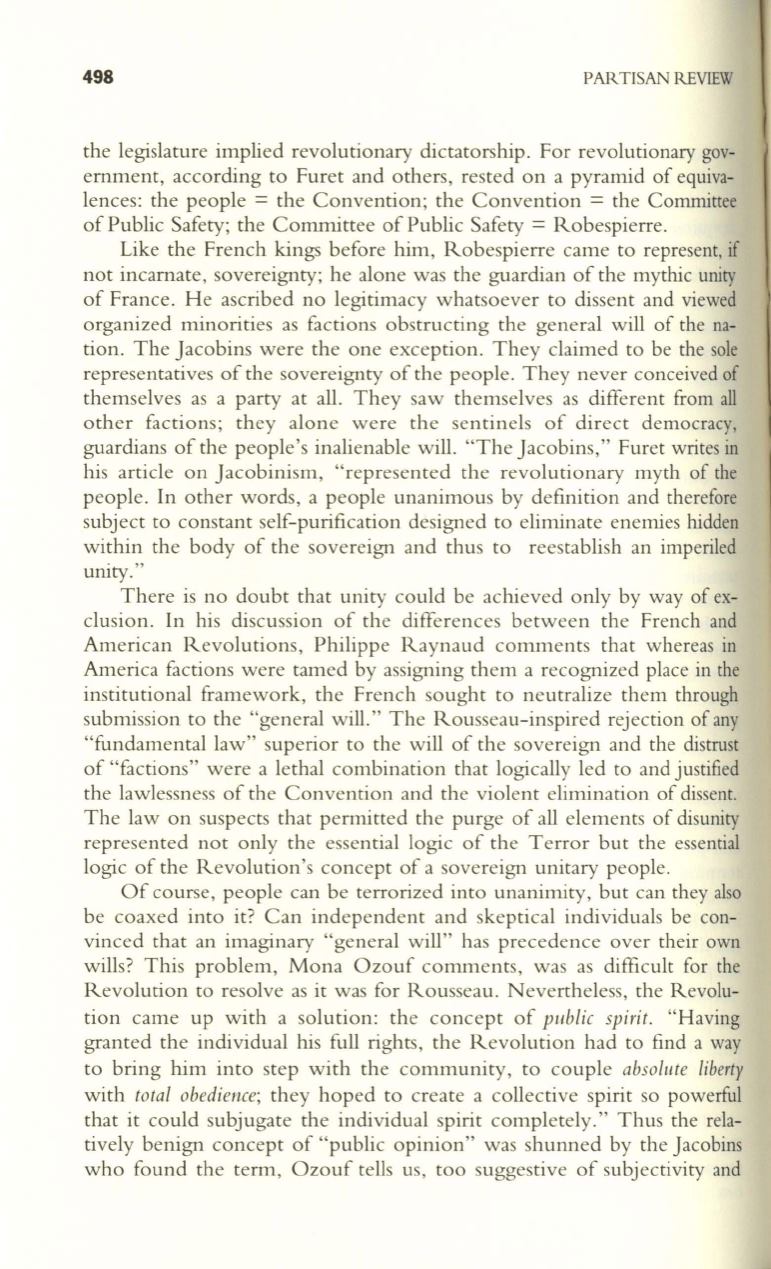
498
PARTISAN REVlEW
the legislature implied revolutionary dictatorship. For revolutionary gov–
ernment, according to Furet and others, rested on a pyramid of equiva–
lences: the people
=
the Convention; the Convention
=
the Committee
of Public Safety; the Committee of Public Safety
=
Robespierre.
Like the French kings before him, Robespierre came to represent, if
not incarnate, sovereignty; he alone was the guardian of the mythic unity
of France. He ascribed no legitimacy whatsoever to dissent and viewed
organized minorities as factions obstructing the general will of the na–
tion. The Jacobins were the one exception. They claimed to be the sole
representatives of the sovereignty of the people. They never conceived of
themselves as a party at all. They saw themselves as different from all
other factions; they alone were the sentinels of direct democracy,
guardians of the people's inalienable will. "The Jacobins," Furet writes in
his article on Jacobinism, "represented the revolutionary myth of the
people. In other words, a people unanimous by definition and therefore
subject to constant self-purification designed to elin"linate enemies hidden
within the body of the sovereign and thus to reestablish an imperiled
unity."
There is no doubt that unity could be achieved only by way of ex–
clusion. In his discussion of the differences between the French and
American Revolutions, Philippe Raynaud comments that whereas in
America factions were tamed by assigning them a recognized place in the
institutional framework, the French sought to neutralize them through
submission to the "general will." The Rousseau-inspired rejection of any
"fundamental law" superior
to
the will of the sovereign and the distrust
of "factions" were a lethal combination that logically led to and justified
the lawlessness of the Convention and the violent elimination of dissent.
The law on suspects that permitted the purge of all elements of disunity
represented not only the essential logic of the Terror but the essential
logic of the Revolution's concept of a sovereign unitary people.
Of course, people can be terrorized into unanimity, but can they also
be coaxed into it? Can independent and skeptical individuals be con–
vinced that an imaginary "general will" has precedence over their own
wills? This problem, Mona Ozouf comments, was as difficult for the
Revolution to resolve as it was for Rousseau. Nevertheless, the Revolu–
tion came up with a solution: the concept of
public spirit.
"Having
granted the individual his full rights, the Revolution had to find a way
to bring him into step with the community, to couple
absolHte liberty
with
total obedience;
they hoped to create a collective spirit so powerful
that it could subjugate the individual spirit completely ." Thus the rela–
tively benign concept of "public opinion" was shunned by the Jacobins
who found the term, Ozouf tells us, too suggestive of subjectivity and


